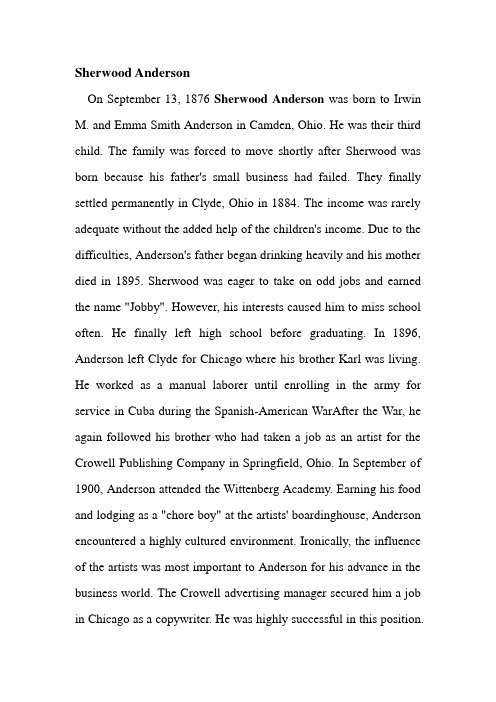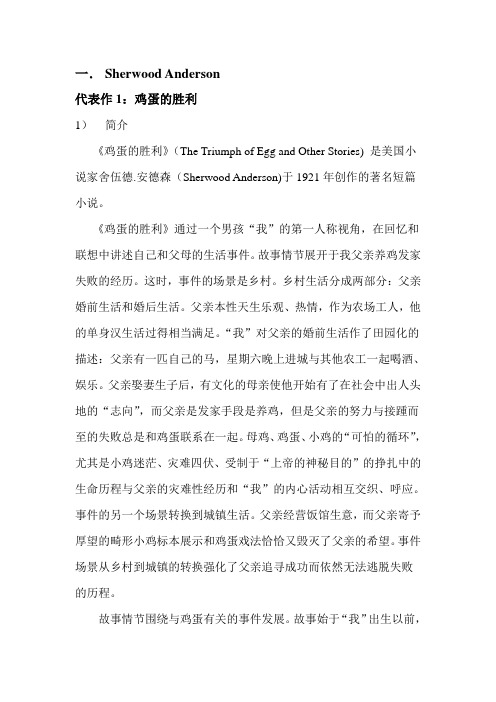舍伍德·安德森人生及作品
Sherwood Anderson中英对照生平介绍

Sherwood AndersonOn September 13, 1876 Sherwood Anderson was born to Irwin M. and Emma Smith Anderson in Camden, Ohio. He was their third child. The family was forced to move shortly after Sherwood was born because his father's small business had failed. They finally settled permanently in Clyde, Ohio in 1884. The income was rarely adequate without the added help of the children's income. Due to the difficulties, Anderson's father began drinking heavily and his mother died in 1895. Sherwood was eager to take on odd jobs and earned the name "Jobby". However, his interests caused him to miss school often. He finally left high school before graduating. In 1896, Anderson left Clyde for Chicago where his brother Karl was living. He worked as a manual laborer until enrolling in the army for service in Cuba during the Spanish-American WarAfter the War, he again followed his brother who had taken a job as an artist for the Crowell Publishing Company in Springfield, Ohio. In September of 1900, Anderson attended the Wittenberg Academy. Earning his food and lodging as a "chore boy" at the artists' boardinghouse, Anderson encountered a highly cultured environment. Ironically, the influence of the artists was most important to Anderson for his advance in the business world. The Crowell advertising manager secured him a job in Chicago as a copywriter. He was highly successful in this position.In 1904, he married Cornelia Lane, the daughter of a wealthy Ohio wholesaler. Although he hoped to become an artist, he lived as a bourgeois husband and father of three for a couple of years. He left Chicago for Northern Ohio in 1906 and over the next six years, he managed a mail-order business in Cleveland and then two paint manufacturing firms. Yet, Anderson increasingly spent his free time writing. On November 27, 1912 he disappeared from his office and was found four days later in Cleveland, disheveled and disoriented, having suffered a mental breakdown. In later writings, Anderson often referred to this episode as a conscious break from his materialistic existence and many younger writers picked up on this, praising his heroic spirit.However much of the story was reconstructed, Anderson did respond to the pivotal moment and broke from his job in Elyria. Instead of becoming a Bohemian artist though, he rejoined the advertising agency in Chicago. He sent for his family, wrote the circulars as he once had, and continued to write feverishly in his free time. In 1914, he divorced Cornelia and married Tennessee Mitchell. That same year his first novel was published, entitled Windy McPherson's Son. Along with his second, Marching Men, of 1917, he later commented that his first novels were raw and immature. He is best known for his classic collection of tales, Winesburg, Ohio, which he had begunwriting in 1915 and generally wrote in the order the stories appear in the text. The book was published in 1919 and received much acclaim, establishing him as a talented modern American author. He espoused themes similar to the later works of T.S. Eliot and other modernists.舍伍德•安德森(Sherwood Anderson又译作薛伍德•安德森)于1876年9月13日出生于俄亥俄州的坎登(Camden) ,他以自己家乡为题材所写的短篇小说,是他最广为人知的作品。
林中之死(舍伍德·安德森作品集)

林中之死(舍伍德·安德森作品集)
《林中之死》是安德森生前最后一部作品,凝结了他对人生对死亡的终极思考。
正如他的墓志铭所言:生命,而非死亡,是一场伟大的冒险。
安德森的文学意义在于,他最早将美国文学带向了一个全新的现代视角——书写个人的内心。
安德森爱写生活不如意的人,他们无法排遣苦闷,又无法平息内心的撕扯,他们厌倦单调的生活,面对时代巨变又感无所适从,于是只能一点点变成孤僻、怪诞、边缘的“飘零人”——这不正是无数现代人的写照吗?所以安德森毫不过时!因为安德森也挣扎过,所以他知道人内心的斗争,有时候和外部世界的战争一样残忍。
安德森的小说似乎总在下雨,却始终透着昏黄温润的光泽,字里行间又带着悲悯和同情,读后像是在雨夜裹紧身上的毛毯,让人身处黑暗仍愿意相信光终将来临。
浅析舍伍德_安德森_鸡蛋_中名字的寓意

2012年第1期安徽文学A N H U I W E N X U E浅析舍伍德·安德森《鸡蛋》中名字的寓意罗琳舍伍德·安德森(Sherwood Anderson )是20世纪早期美国著名的小说家。
海明威和菲茨杰拉德等人都受他影响过,海明威曾说:“他是我们所有人的老师。
”其主要作品有:《小城畸人》、《穷白人》和短篇小说集《鸡蛋的胜利及其他》等。
《鸡蛋》是安德森短篇小说中的经典作品,使其荣获了美国《日晷》杂志颁发的最佳优秀短篇小说奖。
《鸡蛋》讲述了美国西部一个普通家庭滑稽而悲惨的生活处境,揭露了美国梦的虚幻。
这篇小说颇受欢迎,已有学者们研究过文中的象征主义、成长主题、黑色幽默等各个方面。
本论文试图探讨文中人名、地名、物名的精心设计与故事情节发展的关系。
细读该故事,笔者发现文中名字的安排并非信手拈来,而是精心设计。
它们与故事情节的发展以及故事主题息息相关,这也是作者为了使故事更有趣、更好地被读者理解所采取的技巧之一。
一、Butterworth文中首次提到的人物是Thomas Butterworth (托马斯巴特沃斯),父亲的老板。
他姓Butterworth ,笔者将其理解为“worth someone ’s butter ”,直译为“值得某人的黄油”。
英语里有固定短语“bread and butter ”,意为“生计,谋生之道”。
故事开头父亲还是一个无忧无虑的单身汉时,他“有自己的一匹马,每个周六晚上骑着它进城去,跟其他的农民们聚聚……喝几杯啤酒”。
年轻时的父亲轻松自在地生活,没有任何来自妻儿的负担和压力。
给巴特沃斯先生打工,就能一人吃饱全家不饿,这是当时父亲的谋生之道。
巴特沃斯这个姓的安排暗示了父亲年轻时轻松愉快的生活状态。
二、Bidwell故事发生地点是Bidwell (彼得威尔小镇)。
单词bid 有几种含义,其一是“出价,投标”,对象通常为可盈利的事。
父亲婚后雄心勃勃,出人头地的愿望非常强烈。
鸡蛋的胜利作品简介

一.Sherwood Anderson代表作1:鸡蛋的胜利1)简介《鸡蛋的胜利》(The Triumph of Egg and Other Stories) 是美国小说家舍伍德.安德森(Sherwood Anderson)于1921年创作的著名短篇小说。
《鸡蛋的胜利》通过一个男孩“我”的第一人称视角,在回忆和联想中讲述自己和父母的生活事件。
故事情节展开于我父亲养鸡发家失败的经历。
这时,事件的场景是乡村。
乡村生活分成两部分:父亲婚前生活和婚后生活。
父亲本性天生乐观、热情,作为农场工人,他的单身汉生活过得相当满足。
“我”对父亲的婚前生活作了田园化的描述:父亲有一匹自己的马,星期六晚上进城与其他农工一起喝酒、娱乐。
父亲娶妻生子后,有文化的母亲使他开始有了在社会中出人头地的“志向”,而父亲是发家手段是养鸡,但是父亲的努力与接踵而至的失败总是和鸡蛋联系在一起。
母鸡、鸡蛋、小鸡的“可怕的循环”,尤其是小鸡迷茫、灾难四伏、受制于“上帝的神秘目的”的挣扎中的生命历程与父亲的灾难性经历和“我”的内心活动相互交织、呼应。
事件的另一个场景转换到城镇生活。
父亲经营饭馆生意,而父亲寄予厚望的畸形小鸡标本展示和鸡蛋戏法恰恰又毁灭了父亲的希望。
事件场景从乡村到城镇的转换强化了父亲追寻成功而依然无法逃脱失败的历程。
故事情节围绕与鸡蛋有关的事件发展。
故事始于“我”出生以前,这时的父亲过着与鸡蛋无关,也不想出人头地的生活。
对父亲的往事,[1]“我”并没有亲身体验,因而这段故事的来源可能是父母,而快乐的生活色彩或是“我”在听到的故事中加以想象成分,或是父亲对往事的情感流露。
在这段描述中,一些情节的联结是通过虚拟语态表达的。
这段故事与其后部分形成对比。
“我”的童年与父母的乡村生活以父亲在发家梦想的驱使下经营养鸡生意为情节,而结果是父亲生意失败,“我”则因为在养鸡场的生活而失去了幸福快乐的童年。
故事的主要情节部分详细讲述的父亲带着他的“宝藏”——畸形小鸡标本—离开乡下进城,而最终再次失败。
sherwood anderson

舍伍德·安德森(Sherwood Anderson又译作薛伍德·安德森)于1876年9月13日出生于俄亥俄州的坎登(Camden) ,他以自己家乡为题材所写的短篇小说,是他最广为人知的作品。
他在书中描述「令人沉思不已的中西部故事」,这些故事显示「作者对于平凡人物深刻的描写与怜悯。
」作为一个马具制造者与临时油漆工的第三个小孩,安德生有说故事的天分。
安德生年轻的时候时常想要做一个经济独立的人。
他结婚之后共生了三个小孩,虽然他努力工作,但是却对现实商场的工作感到不满。
一直到1909年时,他因为过度辛劳而生成暂时性的精神崩溃。
就在那一年,他开始一边担任芝加哥一家广告公司的记帐员,一边撰写科幻小说。
在芝加哥时,他遇见很多位作家,例如卡尔.山得堡(Cark Sandburg) ,以及创立芝加哥文学复兴运动的西奥多.得瑞司尔(Theodore Dreiser) 。
这些作家中,有很多人和安德生一样,都是在中西部的小城镇中长大的。
在两次世界大战之间,薛伍德.安德生对于美国文坛有相当大的影响。
他擅长把每天谈话中的真实话语用文字表达出来,并且用全新的格式与风格撰写文章,打破了过去常规、守旧的形式。
他对于美国新一代的作家也有很深远的影响,其中最有名的就是恩斯特.海名威(Ernst Heimingway) 以及威廉.福克纳(William Faulkner) 。
许多老牌的作家常常会施压年轻作家,要求他们应该要写自己最擅长的东西。
但是当安德生于1924年在纽奥良遇到福克纳时,他鼓励福克纳撰写有关密西西比家乡的故事。
安德生的作品中,以1919年集结短篇小说出版的俄亥俄州的威尼斯堡(Winesburg, Ohio) 被普遍认为是最好的作品。
Have you ever written a story about your hometown? Maybe you think it's too "boring" to write about. If so, take a look at American writer Sherwood Anderson. Born on September 13, 1876, in Camden, Ohio, he is best known for his short stories that reflect his small-town, Midwestern past. Described as "brooding Midwest tales," they reveal "their author's sympathetic insight into the thwarted lives of ordinary people." This third child of a harness maker and sometime house painter had a fondness for storytelling.As a young man, Anderson was intent on establishing his financial independence. He married, had three children and worked, with growing dissatisfaction, in the corporate world until 1909, when he suffered a brief nervous breakdown. He began to write fiction that year while working as a copywriter at a Chicago advertising agency. In Chicago, he met other thriving writers such as Carl Sandburg and Theodore Dreiser, who formed a sort of Chicago literary renaissance. Many of them, like Anderson, had grown up in small Midwestern townsSherwood Anderson had an important influence upon American writing between World War I and World War II. He is credited with capturing the real sound of everyday speech in his writing and experimenting with new forms and styles, breaking down tired, old formulas. He influenced a whole generation of writers, most notably Ernest Hemingway and William Faulkner. Many experienced writers have stressed that a young writer should write about what he or she knows best. While in New Orleans in 1924, Anderson encouraged Faulkner to write about his home county in Mississippi. Anderson's 1919 collection of short stories, Winesburg, Ohio, is widely considered his best work.舍伍德·安德森(Sherwood Anderson,1876-1941),1876年9月13日出生在中西部俄亥俄州克莱德镇的一个贫寒家庭。
Sherwood Anderson

Poor White (novel)《穷白人》
Death in the Woods
《林中之死》
Page 4
Winesburg, Ohio
Published in 1919 Anderson stresses that individuals themselves create their own isolated lives. Anderson‟s main goal is to destroy the “walls” between human beings.
Page 9
“Loneliness”
Enoch Robinson is embodies the loneliness that Anderson focuses on Robinson actually creates a separate world for himself, alienating himself from the rest of the world
Page 15
One major theme underscores all of Anderson‟s notable works: loneliness. Anderson stresses the fact that human beings are responsible for their own loneliness, and that humans may break down the barriers of loneliness if they only recognize that they are trapping themselves.
Page 11
Winesburg, Ohio
舍伍德·安德森:纸药丸

舍伍德·安德森:纸药丸现代美国文学的语言在很大程度上应该归功于舍伍德·安德森的创新,没有他,我们也许现在还在亦步亦趋地模仿欧洲文人别扭的贵族语言风格。
他是我们所有人的老师。
——海明威© Viktoria Prischedko纸药丸(美)舍伍德·安德森陈胤全译他是个白胡子老头,有一只大鼻子和一双大手。
早在我们认识他之前,他就是医生了,骑一匹疲倦的白马在温士堡走街串巷,挨家挨户地行医。
后来他娶了个富家小姐,她父亲过世时留下一座土地肥沃的农场。
姑娘为人娴静,高个子,皮肤黝黑,许多人都觉得她很漂亮。
镇上的人都不解她为何要下嫁给这个医生。
结婚后不到一年,姑娘便香消玉殒。
医生双手的指关节出奇地大。
当他握起拳头,一个个指节像一个个没有油漆的核桃大小的木球,用钢条紧紧穿在了一起。
他爱吸玉米芯烟斗(译注:用一截玉米芯做斗钵的烟斗)。
妻子死后,他整天呆坐在空荡荡的办公室里,挨着一扇结满了蛛网的窗。
他从没打开过那扇窗。
八月的某天,天气闷热,他试着开窗,却发现窗户已经牢牢卡住,之后便再也没把这事放在心上。
小镇早已将他遗忘。
但在瑞菲医生心里,还埋着一点好的种子。
他那有霉味的办公室在巴黎布庄的楼上,他一个人在那儿夜以继日地工作,重新筑起亲手摧毁的东西。
他建造了一座座小小的真理金字塔,又把它们推翻,这样便有真理可以再建一座。
瑞菲医生个子很高,一套衣服已经穿了十年,袖子磨出了毛边,膝盖和手肘处有许多小窟窿。
他在办公室也会披一件麻布开衫,口袋很大,他不断往里头塞小纸片。
不消几周,纸片便会变成硬硬的小纸球。
口袋一旦装满,他就将小纸球倒在地上。
十年来他只有一个朋友——约翰·斯帕尼亚德。
约翰也是个老头,有一座苗圃。
有时瑞菲医生会开他玩笑,从口袋里掏出一把小纸球,朝园艺师傅扔过去。
“把你砸得昏头耷脑了吧,你这个啰里啰唆、没事想太多的老头子。
”他大声说,笑得浑身发颤。
瑞菲医生从追求高个黝黑的姑娘开始,到娶她为妻,再到继承妻子遗产的故事,可以说是一则奇谈,讲起来津津有味,犹食温士堡果园里的畸形苹果。
美国文学第16章安德森

Anderson Stein Cather Wolfe
Lewis
Sherwood Anderson(1876-1941)
life(舍伍德· 安德森)
Sherwood Anderson was born in Camden, Ohio. His parents led a transient life, moving from one place to another after work. His father had served in the Union Army but eventually ended up keeping a small harness(马具)-repair shop and then working as a house-and-barn painter, though calling himself a "sign-writer". Anderson attended school only intermittently, while helping to support the family by working as a newsboy, housepainter, stock handler, and stable groom. At the age of 17 Anderson moved to Chicago. There he attended business classes at night, and spent his days as a warehouse laborer. During the Spanish-American war Anderson fought in Cuba and returned after the war to Ohio, for a final year of schooling at Wittenberg College, Springfield.
- 1、下载文档前请自行甄别文档内容的完整性,平台不提供额外的编辑、内容补充、找答案等附加服务。
- 2、"仅部分预览"的文档,不可在线预览部分如存在完整性等问题,可反馈申请退款(可完整预览的文档不适用该条件!)。
- 3、如文档侵犯您的权益,请联系客服反馈,我们会尽快为您处理(人工客服工作时间:9:00-18:30)。
theme
Expose the damages by industrialization to inhabitants of Middle Western small towns • They are twisted spiritually.
• .
style
• He paid less attention to the plots and more to the characters. • begin nowhere and ended nowhere) • “未详其始不知所终” • direct authorial address to the reader; a circular, not linear, narrative structure; plot subordinated to characterization; simple style and vocabulary; and images drawn from elemental aspects of nature.
• Sherwood Anderson left behind a substantial amount of work, including short fiction, novels, plays, essays, and memoirs. He is best known for his work Winesburg, Ohio (1919), a collection of stories about characters in a fictional small town.
• 36, Anderson stopped his work, left his office and never returned. • He is quoted as writing, "I was a business man and got sick of it, and went into writing, not to make a success, but to give myself an interest in life" • He divorced and remarried for four times. • On March 8, 1941, on his way to a goodwill tour of South America, Anderson died. He had swallowed a bit of a toothpick at a farewell party, which then penetrating his intestines, causing the peritonitis that killed him.
• Clinging to some conventional beliefs and living by their own truth, they were frustrated by their unfulfillment of their passions and dreams • They became very lonely and eventually, they are turned into grotesques by their inability to express their ideas to others and by misunderstanding between lovers, friends, mother and son and so on. • then the sense of alienation, loneliness, and want of love
Sherwood Anderson (1876-1941)
• •
Life experience
• Born into a poor family in southern Ohio, the third of seven children in a family • The family was forced to because his father's small business had failed. • They finally settled permanently in Clyde, Ohio in 1884. • Due to the financial difficulties, Anderson's father began drinking heavily. • When he was 12 years old, he began to take on odd jobs. • He finally left high school before graduating. • He worked as a manual laborer until enrolling in the army for service in Cuba during the Spanish-American War.
Main Characters
• Lower class figures from small town • Unsuccessful, depraved, lonely people
What caused them to become grotesques?
• America passed from a rural to a predominantly industrial society. The social transition had been a painful experience in small towns. The coming of the machine industry put lots of craftsman out of business, took away their pride and joy in achievement. The blind belief of materialism mingled with a feeling of doubt and fear among the small town residents. Industrialization dehumanized the men and women and made them grotesques and unable to communicate and love.
His Literary Career
• The literary output of Sherwood Anderson is abundant. • He published eight novels, four collections of short stories, three books of poems and plays, more than 300 articles, reviews and essays, and three volumes of autobiography. • Upon his death in 1941 he left behind "eleven hundred manuscripts, including unpublished fiction and journals, and over 12,000 letters written to and by most of the artistic and intellectual leaders of the twentieth century"
Winesburg, Ohio
Anderson and Ohio
•
Winesburg, Ohio
A group of related short stories rather than a novel. Individual tales are connected in a loose but coherent structure. is a collection of isolated stories but, rather, short story cycles; that is, collections of stories with common themes, imagery, and tone, and often with common setting and characters Narrator: naï and young reporter for the local ve newspaper, George Willard. Portrays a series of grotesques .
and understanding turned people into grotesques.
• Winesburg as a microcosm of the universal: The figures of Winesburg were forced to handle issues and events which people universally underwent. Many common threads between man and between the self in relation to the world exist which the grotesque figures deal with in a manner to which any reader could relate. Winesburg then becomes Any Town, USA and the characters symbolize flaws and struggles in the universal human experience. Winesburg functions synecdochally for the typical human community.
• Many of the tales were based on a life Anderson had witnessed in Clyde, Ohio, the town where he spent most of his childhood and adolescent years. • The impressions he gained from the town life and character of Clyde explains why he gave the book the subtitle, "A Group of Tales of Ohio Small Town Life."
